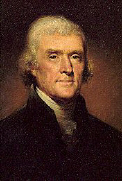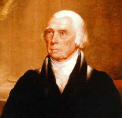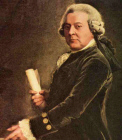Multiple Choice
Identify the
letter of the choice that best completes the statement or answers the question.
|
|
|
Read the entire passage before you try to answer the
questions
Background of Marbury v Madison
In 1800 the government of the
United States was still new. None of the branches, legislative-executive-judicial, was sure of their
authority. This was especially true of the Supreme Court. What authority did the Supreme Court have?
What cases could they rule on? Could they tell the other branches what to do? Article III of the
Constitution established the Supreme Court but it was not very specific about the authority the court
had.
The President of the United States has the power to appoint judges to the federal
courts. Usually, the President appoints individuals who are members of his own political party or who
share his ideas about politics.
In 1800, John Adams was President. Adams was a Federalist who wanted a
strong central government. There was an election that year. Thomas Jefferson, who belonged to another
political party, got elected. Jefferson was an anti-Federalist who wanted the states to have more
power. There were many positions in the federal government that were empty. Before he left office,
President Adams tried to fill these positions with people who shared his ideas.
President Adams appointed 58 new people. He asked his Secretary of State, John
Marshall, to deliver the paperwork to these people so they could start their new jobs. Marshall
delivered most of the papers. He was in a hurry, so he left some of the papers for the new Secretary
of State, James Madison, to deliver. When he came into office, President Thomas Jefferson told
Madison not to deliver the papers to some of the people Adams had
appointed.
One of the individuals who didn't receive his papers was William Marbury. He sued
James Madison and tried to get the Supreme Court of the United States to issue a writ of
mandamus. A writ is a court order that forces an official to do something. Marbury argued
that a law passed by Congress (the Judiciary Act of 1789) gave the Supreme Court of the United States
the power to issue this writ. If the Court issued the writ, Madison would have to deliver the papers.
Then Marbury would become a justice of the peace. |
 Thomas Jefferson Thomas Jefferson
 James Madison James Madison
 John Adams John Adams | | |
|
|
|
1.
|
Marbury based his argument on the Judiciary Act of 1789. What did he claim the Act
did? a. | allowed the Congress and the President to
ignore the Supreme Court | c. | gave the Supreme
Court the power to issue writs of mandamus | b. | forced one president to honor the acts of other
presidents | d. | forced the President to make Federal court
appointments | | | | |
|
|
|
2.
|
What
was the political philosophy of Thomas Jefferson a. | Federalist | c. | Anti-Federalist | b. | Constitutionalist | d. | Republican | | | | |
|
|
|
3.
|
What
is a writ of mandamus? a. | an appointment to the court made by the
President | c. | an oath taken by all Federal employees to
protect and defend the constitution | b. | an order issued by the court requiring someone to do
something | d. | a requirement that the police produce a writ
of habeas corpus | | | | |
|
|
|
4.
|
What
was the political philosophy of John Adams? a. | Democrat | c. | Anti-Federalist | b. | Republican | d. | Federalist | | | | |
|
|
|
5.
|
Who
tried to block the appointments of President Adams, who was leaving office? a. | Justice
Marshall | c. | James Madison | b. | President Thomas
Jefferson | d. | James Marbury | | | | |
|
|
|
6.
|
If the
Supreme Court issued the writ of mandamus, Madison would be forced to deliver the commission to
Marbury. a. | false | c. | true | b. | no way to tell from the
reading | | | | |
|
|
|
7.
|
Why
did Marbury sue James Madison? a. | Madison was Secretary of State and an
Anti-Federalist | c. | Marbury did not like
Madison | b. | Marbury was a Federalist | d. | As Secretary of State Madison was supposed to deliver the
paperwork to Marbury | | | | |
|
|
|
8.
|
Under
our political system, who has the power to appoint judges to the federal courts. a. | the House of
Representatives | c. | judges are elected not
appointed | b. | the President | d. | the Supreme Court | | | | |
|
|
|
9.
|
What
did William Marbury want the government to do. a. | He wanted the Senate to force Jefferson to honor his
appointment | c. | He wanted the Congress to force Jefferson to
honor his appointment | b. | He wanted the Supreme Court to issue a writ of
mandamus. | d. | He wanted the Supreme Court to issue a writ
of habeas corpus | | | | |
|
|
|
10.
|
An Act
is a law passed by Congress. a. | neither true nor false | c. | false | b. | both true and
false | d. | true | | | | |
|
|
|
11.
|
What
job was William Marbury trying to get with the government? a. | Congressman | c. | Army Captain | b. | Justice of the Peace
(judge) | d. | Senator | | | | |
|
|
|
The Supreme Court Ruling by John Marshall
The Supreme Court of the
United States had to decide the case. The new Chief Justice of the United States was John Marshall.
He was the same person who had been unable to deliver the paperwork in the first
place!
The new chief justice, John
Marshall, understood that if the Supreme Court issued a writ of mandamus (i.e., an order to force
Madison to deliver the commission), the Jefferson administration would ignore it, and thus
significantly weaken the authority of the courts. On the other hand, if the Court denied the writ, it
might well appear that the justices had acted out of fear. Either case would be a denial of the basic
principle of the supremacy of the law. Instead, Marshall found a common ground where the Court could
chastise (scold) the Jeffersonians for their actions while enhancing the Supreme Court's power. His
decision in this case has often been hailed as a judicial tour de force (a skillful decision showing
power).
Marshall’s Decision
1. Marshall declared that Madison should have delivered
the commission to Marbury.
2. Even though the Judiciary Act of 1789 (passed by Congress) gave the
Supreme Court the power to issue writs of mandamus, Marshall said the Judiciary Act was wrong because
it violated Article III of the Constitution
3. Because of the above two actions, Marshall ruled that
the Supreme Court did not have the authority to issue the write of
mandamus
So, while the case limited the court's power to issue writs in this case
because it violated the Constitution, it greatly enhanced the Supreme Courts authority to say what
was and what was not constitutional. From this point on the Supreme Court what have the authority to
say what was constitutional.
Just as important, it emphasized that the Constitution is the supreme
law of the land and that the Supreme Court is the arbiter and final authority of the Constitution. As
a result of this court ruling, the Supreme Court became an equal partner in the government.
| |
|
|
|
12.
|
If
John Marshall issued a writ of mandamus, forcing Jefferson to deliver the papers that allowed Marbury
to become justice of peace, what would Jefferson do in answer to the writ? a. | most likely fire John Marshall from the
Supreme Court | c. | most likely ignore the writ
(order) | b. | resign from office | d. | most likely obey the writ
(order) | | | | |
|
|
|
13.
|
If
Jefferson obeyed the court order it would _____ the court, if Jefferson ignored the court order it
would _____ the court. a. | weaken - strengthen | c. | do nothing to - have no effect on
| b. | strengthen -
weaken | | | | |
|
|
|
14.
|
If the
Supreme Court refused to issue the writ of mandamus it would ....... a. | allow Congress to outlaw the Supreme
Court | c. | allow the President to outlaw the Supreme
Court | b. | make the court look like it was not afraid of Jefferson or
public opinion | d. | make the court look like it was afraid of
Jefferson | | | | |
|
|
|
15.
|
What
basic principle was Justice Marshall most concerned with? a. | That all branches of government, including
the Constitution be equal parts of the government. | c. | That the Jeffersonians be
defeated | b. | That Marbury get his commission as Justice of the
Peach | d. | That the law (Constitution) be supreme over
any person, party or branch of government | | | | |
|
|
|
16.
|
How
did the decisions of Justice Marshall make the Supreme Court stronger. a. | He established the principle that only the
Supreme Court could say what was and what was not constitutional | c. | He ruled that Marbury should get his
commission | b. | He ruled that Jefferson had the right to withhold
Marbury’s commission | d. | He established
the principle that only the Congress could say what was and what was not
constitutional | | | | |
|
|
|
17.
|
What
is an additional principle established by Justice John Marshall in the Marbury v Madison
case. a. | The Congress could pass laws (acts) that
superceded the Constitution | c. | The Constitution
is the supreme law of the United States | b. | The President was inferior to the
Congress | d. | The Congress was inferior to the
President | | | | |
|
|
|
18.
|
What
is an additional principle established by Justice John Marshall in the Marbury v Madison
case? a. | Congress has the right to pass laws that may
contradict the Constitution | c. | Only the Supreme
Court can determine what laws are constitutional or not | b. | The President could refuse to enforce laws
that he felt were unconstitutional | d. | That the Federalists are right and the Anti-Federalists
are wrong | | | | |
|
|
|
19.
|
In the
2000 elections there was a great deal of debate and many law suits about the election outcome in
Florida. Finally the Supreme Court ruled that both sides had to accept the decisions of the State of
Florida, giving George Bush the election. When the Supreme Court made its ruling, both sides backed
off and accepted the courts decision. Justice John Marshall’s ruling in Marbury v Madison made
this possible. a. | This statement is
false | c. | There is no way to tell if this statement is
true or false | b. | This statement is true | | | | |
|
|
|
20.
|
Ours
is a government of laws, not men a. | This statement has no
meaning | c. | This statement is
true | b. | This statement is
false | d. | There is no way to tell if the statement is
true or false | | | | |
|